Just about every college student finds one person who shines through the crowd and influences classmates for the good.
For me, that person was Nan Grogan.
When I was a freshman in 1963, she was the super-serious junior who was pushing the rest of us to join the civil rights movement. At her urging, I tutored poor black Fredericksburg children in a YWCA after-school program.
I didn’t really know Nan back then, but I never forgot her. A few years ago I Googled her name and learned that since my first memories of her more than 50 years ago she has never stopped being an activist.
Nan Grogan Orrock ’65 is among the South’s most veteran and well-respected advocates of social change. She is one of the longest-serving and most progressive members of the Georgia legislature and has left her mark on every sector of social justice: civil rights, women’s rights, worker rights, gay rights, environmental rights.
She’s chased after cross-burning Ku Klux Klansmen, cut sugar cane in Cuba, started an alternative newspaper, organized unions, led strikes, been arrested a bunch of times, and still stands on picket lines. At 70, she’s far from done. I had to finally get to know her. The week before Christmas, I flew to Atlanta and sat down with her at the State Capitol.
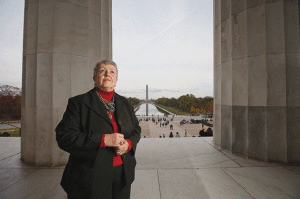
Georgia Sen. Nan Grogan Orrock, here at the Lincoln Memorial, was a Mary Washington junior when
she attended the March on Washington.
What she learned there compelled her to devote
her life to working for equal rights.
Photo by Norm Shafer.
It’s a chilly day and the Capitol is nearly deserted. Long coat flying, Nan swoops into her office from one of many Christmas gatherings and apologizes for being late.
She laughs heartily at my memory of her seriousness in ’63. She says she felt like a pariah, and I can understand. When girls like me were polishing our Pappagallo flats for the next U.Va. fraternity weekend, Nan was registering black voters in Georgia and working alongside young civil rights leaders Julian Bond and Stokely Carmichael.
She’s not the least bit self-righteous about what she’s done, and she doesn’t regret a thing. She was relieved to learn at a reunion years ago that her classmates didn’t dislike her. Instead, they hailed her for being “on the right side of history.”
Some told her that when their kids asked what they’d done for civil rights back then, they answered: “Well, I knew Nan Grogan, and she was doing a lot.”
This is the story of the woman who gave me my first signal that it was not merely OK to stand up for human decency. It was imperative.
Nancy Margaret Grogan was born in Abingdon, Va., in November 1943. Her dad, Harold Grogan, the first in his South Georgia sharecropping family to go to college, was a forest ranger. Her mom, Helen, met Harold when she was secretary at a hydroelectric dam being built in her home state of Tennessee.
The family moved to Staunton, where Harold took a job running the Chamber of Commerce. Helen, with five children, was a pillar of the church, charities, and Democratic politics.
Nan was captain of Robert E. Lee High’s cheerleading squad and quarterback on the girls’ powder puff football team. She was assertive enough that a teacher nicknamed her “Susan B.” for 19th-century feminist Susan B. Anthony. Nan learned American Sign Language to sign at church for kids from the nearby Virginia School for the Deaf and the Blind. She briefly dated a deaf boy, and she always took the side of the disadvantaged.
Nan knew few African Americans except for the occasional woman the family hired to clean or iron. The n-word was forbidden at the Grogan house. “Small town, upper South,” she said of Staunton. “All-white churches, all-white schools. There was not a lot to give me cause for reflection.”
Nan wanted to study English at the University of Virginia, but back then it admitted women only to its schools of nursing and education. So she went to Mary Washington, then officially Mary Washington College of the University of Virginia.
She was a serious student, on a partial scholarship, and worked in the psychology department to defray tuition. After freshman year, she won a scholarship to an institute at Chautauqua, N.Y., where she spent the summer immersed in literature, theater, and culture.
Everything changed in the summer of 1963. She landed a summer job with NASA in Washington, D.C., and lived with her aunt. She worked alongside African Americans for the first time and met her first white liberal, her boss. She didn’t tell her Aunt Margie when she left for work the morning of Aug. 28, 1963, but she and her co-workers planned to go to the March on Washington for Jobs and Freedom. That Wednesday, in front of the Lincoln Memorial, they were joined by a quarter-million people.
Addresses that day like Martin Luther King Jr.’s “I Have a Dream” speech moved her. But what transformed her were conversations with other marchers, particularly those from Danville, Va. Eleven weeks earlier, a mob of white lawmen had savagely attacked black civil rights demonstrators. Nan heard about conditions there, where black people were restricted to menial jobs, their neighborhoods denied basic services, and their pleas for fairness answered with whacks of billy clubs. She saw the marks still on their bodies and asked herself, how did I not know about this? “I’m mis-educated,” she remembered thinking. “I don’t know the truth about this country.”
On the sidelines of the march, Nan recognized Mary Washington rising senior Susie Solf-Phillips ’64, who urged Nan to join the YWCA’s race relations committee.
Over spring break in 1964, when others of us were sunbathing, Nan and the YWCA drove Virginia college women to Atlanta for a quick baptism in civil rights. They walked past a Sunday school room in the basement of Ebenezer Baptist Church to hear Dr. King leading a discussion on nonviolence. She registered voters in working-class black neighborhoods, met her first members of the Student Nonviolent Coordinating Committee (SNCC), and decided to join its 1964 Freedom Summer.
Nan’s classmate Judy Sutherland ’65, a student leader and now a retired Presbyterian minister, said Nan was an inspiring, if lonely, figure. “When we piddled around with some of our concerns, she had better things to do with her time. She had what I call ‘holy impatience,’ way ahead of most of us.”
Nan quietly lined up housing in Atlanta for Freedom Summer but was vague with her folks. Her dad, heading to a meeting in Georgia, insisted on driving her. Following directions to her boarding house, Harold Grogan realized they were drawing deeper into a black neighborhood. When they met the African American landlady, she directed Nan to the office. “What office?” Harold asked.
They climbed steps to a ragtag SNCC office over a dry cleaners shop and saw the posters of black power fists in the air. Later Nan’s father told her: “I don’t understand what you’re doing. I’ve worked all my life to get out of poverty and you’re running back to it.” He drove off, pulled over to a pay phone, and called Nan’s mother in tears.
By day Nan typed at a Veterans Administration hospital and at night pulled phone duty at SNCC. Activists called in all night long with reports of cross-burnings, beatings, and killings. Nan was there when young civil rights workers James Earl Chaney, Andrew Goodman, and Michael “Mickey” Schwerner went missing during a Mississippi voter registration drive. Their bodies were found buried in an earthen dam. KKK members were later convicted in the killings.
She met SNCC chair and current Atlanta congressman John Lewis, as well as Julian Bond, Robert Moses, and other civil rights icons. Bond, former national chair of the NAACP, remembered Nan as “unafraid to take the bull by its horns, and fearless when principles were at issue.”
That August, Nan, who’d quit the VA job, filled in at SNCC’s office in Greenwood, Miss. She hid in the back seat when black colleagues drove, because whites were incensed to see whites and blacks together. Her first arrest came when, borrowing a car for a cigarette run, she made a U-turn in front of the office. Police, watching for the slightest infraction, hauled her to jail.
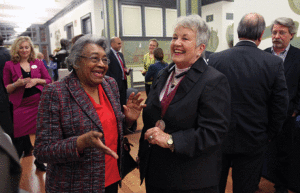
Fredericksburg civil rights and community leader Marguerite Young chats with Orrock after the dedication of the James Farmer Lecture Hall in November. Orrock wears the UMW Monroe medal given to her for lasting service to humanity.
Photo by Norm Shafer.
The last thing Nan wanted to do after that summer was return to Mary Washington. She told her folks she was staying in Atlanta. Helen Grogan dispatched a friend and one of Nan’s brothers to bring her home.
Senior year, Nan was as much activist as academic. She was living in Trench Hill, the honors dorm, which she describes as “a little hotbed” of intellectual foment. She admired Myra Irby, the history instructor who was their house mother.
Nan helped start the Virginia Student Civil Rights Committee, a band of activists from several Virginia colleges, white and black. Over Christmas, they drove clothing and supplies to southern Mississippi. In the small city of Laurel, the racially integrated group sought service at a segregated restaurant and was arrested. Nan spent Christmas in jail, singing freedom songs with her friends. SNCC bailed her out when, she said, her father “sorrowfully but firmly” declined.
Nan was in college to become an English teacher, and she had arranged to student-teach at a black high school in central Virginia. Mary Washington Chancellor Grellet Simpson nixed that. “He said, ‘No, absolutely not. I won’t allow it,’ ” Nan recalled. “I told him, ‘Well, if that’s the case, I won’t be getting my teaching certificate – because I won’t teach at a white segregated school.’ ”
Senior year, she planned a civil rights project in Virginia’s Black Belt, six Southside counties with high populations of poor blacks, low black voting rolls, and histories of plantation slavery and extreme prejudice. She organized a downtown Fredericksburg protest in sympathy with the March 1965 “Bloody Sunday” in Selma, Ala., when police beat and tear-gassed voting rights marchers. She helped put on the Virginia Student Civil Rights Committee’s conference at Hampton Institute, raised money for her projects, and recruited students for the summer in Southside.
Looking back, she has no idea how she kept up her grades, much less earned Mortar Board honors. “Lord,” Nan said, “How did I ever graduate?”
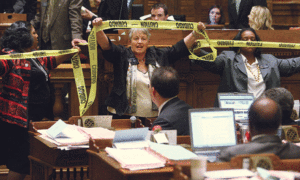
At age 70, Orrock has not stopped standing up for what she believes is right. Here she and colleagues ring the floor of the Georgia Senate Chamber in 2012 holding yellow caution tape to protest a bill they believe to be harmful to women.
Photo provided by AP Images/Jason Getz, AJC.
Her degree complete, she plunged ever deeper into the movement in Southside. Paying herself $6 a week in donations from Northern foundations, barely enough to cover Cokes, nabs, and cigarettes, she spent her first 18 months out of college leading anti-racism projects in hostile territory. She set up a Freedom House at an old dwelling in Victoria, Va., in Lunenburg County, where blacks and whites huddled around a coal stove to do voting rights work. One day, the house was sprayed by shotgun fire as a male activist stood in the doorway. He wasn’t injured, but lead pellets parted his hair.
Another day, Nan crested a hill in her donated VW Beetle to see Klan members burning a cross at the rental house where she was staying in the little town of Blackstone, in Nottoway County, Va. In a move she admits was foolhardy – “I would operate out of this sense of outrage” – she chased the Klansmen’s big car across town. What she would have done if she’d caught up with them, she doesn’t know – to start that old VW, she had to get out and push it.
North Carolina Klansmen came from over the nearby state line and held massive rallies in Victoria against the activists. Because town leaders condoned this, Nan and her committee boycotted businesses and organized car pools to take black shoppers elsewhere.
Helen Grogan begged her to come home from Southside; Nan refused. Years later, her mother wrote to say how proud she was of her daughter, and how early on Nan had recognized deeper truths than her mother could see.
After the Black Belt project ended, Nan helped SNCC and the Southern Student Organizing Committee (SSOC) set up activist networks across the South. In 1967, she married young Gene Guerrero, an SSOC member. They landed in North Carolina, where they connected student activists with textile workers seeking better pay and working conditions.
Nan’s attention turned to white working people. She discovered that some textile workers belonged to the Klan, and she began to realize they were not just a “howling mob” of haters and cross-burners but people with their own sagas of exploitation. Nan and Gene helped members of the Textile Workers Union of America organize at a North Carolina sock factory and supported them during a strike.
The couple moved to Atlanta and with friends founded The Great Speckled Bird, which became one of the longest-running alternative papers of its time. The Bird featured uncensored pieces about politics and culture. Women’s voices in particular grew strong there. Back at SNCC, Nan and other women had commiserated that men ruled the civil rights movement, and it had stuck in Nan’s craw ever since. Women’s stories of gender discrimination in The Bird led to the founding of the Atlanta Women’s Movement.
In 1970, Nan spent six weeks in Cuba with the Venceremos Brigade, young people from all over who demonstrated solidarity with Cubans suffering from the U.S. embargo. Nan was finally able to use the Spanish she’d studied under Professor Louis Cabrera at Mary Washington. She cut sugar cane in the fields and met communists and members of the radical American group the Weather Underground. On her return, at age 26, her marriage crumbled.
In 1971, she decided to join the working class at a National Biscuit Company, or Nabisco, plant in Atlanta. After years of low wages, she was earning decent pay at one of the few union shops in the city. She was there for 17 years.
Packing cookies and crackers all day or night, she’d go to the cafeteria to find workers sitting apart by race. As shop steward with the Bakery, Confectionery, and Tobacco Union, she shook things up by sitting with black friends and helping lead a strike when a white supervisor known for racism fired a popular black worker.
In the early 1970s, Nan married Charlie Orrock, a Spotsylvania County native and former Green Beret who went to work for human rights and labor organizations. He moved to Atlanta to be with Nan and work in a steel mill. Their son Danny was born in 1977, and son Jesse in 1983.
Nan and Charlie spent years advocating for union groups and working families in Atlanta. In 1984, with baby Jesse on her hip, Nan led a two-year protest against construction of a cargo facility in a historic residential area of central Atlanta. Though she lost that fight, Atlanta Democrats urged her to run for the Georgia House of Representatives. Divorced again by then, she was sworn into office in 1987.
Her experiences as a factory worker and single mom – troubles with child care, unemployment insurance, medical care, and workers’ comp – furnished an instant legislative agenda. She saw that Republican and Democratic women favored such family-friendly bills, so she founded the bipartisan Georgia Legislative Women’s Caucus. It’s pushed through a long list of laws, as has the Georgia Working Families Caucus she also founded.
Nan helped remove Confederate symbols from the state flag and led passage of the Georgia Family Medical Leave Act for state employees, one of the strongest in the South. She championed the Georgia Hate Crimes Act, the state’s omnibus AIDS statute, and an exhaustive roster of progressive legislation ranging from lead paint removal to insurance coverage of testing for sexually transmitted diseases.
“Thousands of Georgians take off work for medical or family leave knowing that they will have a job when they get back because of Nan’s work,” said former aide Rebecca Dameron. “She’s worked so hard for fairness and people’s rights. Few people even know to connect her with all the rights she’s won for them.”
Nan moved from the House to the Senate in 2006. Her district covers the neighborhoods she first walked as a Mary Washington student during that 1964 spring break voter drive. Sixty percent African American and heavily Democratic, the 36th District is Atlanta’s most diverse – public housing, mansions, artists, gays, old people – a rich blend that some call “urban bohemians.” Nan lives in the same Ormewood Park house she’s had for almost four decades.
Nan’s life in Atlanta is one of constant motion. She’s on a slew of nonprofit boards and committees and has hundreds of friends. She loves to sing, and every week she gets together with friends to harmonize on everything from Broadway hits to old freedom songs she once sang during civil rights arrests. She still goes out on picket lines before dawn – most recently with Atlanta fast food workers seeking higher wages.
Now, with 27 years at the Capitol, she has the third highest seniority. She was the first woman in Georgia history to serve as House majority whip and is the rare white member of the Georgia Legislative Black Caucus. Her full-time office job – in addition to her part-time work as senator – is bringing more women into elective office across the United States. She’s president of the Women Legislators’ Lobby, a national nonpartisan network that trains and supports candidates.
Over the years, she’s headed many nonprofits and foundations, including the Fund for Southern Communities, which supports social and environmental projects in Georgia and the Carolinas, and the Center for Policy Alternatives, pushing for progressive state legislation across the country.
Last November, Nan returned to UMW by special invitation to speak at the dedication of the James Farmer Lecture Hall, so named for the late UMW professor of history and civil rights leader. (Learn more about the dedication on page 3.) In the 1960s, Nan had known Farmer, the architect of the 1961 Freedom Rides and co-founder of the Congress of Racial Equality.
That weekend, the university surprised Nan with the Monroe medal for lasting service to humanity. When we talked later, she ticked off ways UMW has been promoting human rights: the digitizing of Farmer’s lectures, the Farmer Fellows study of immigration and other human rights issues, the new faculty position in multiculturalism, and the award-winning 2011 exhibits and programs on the Freedom Rides’ 50th anniversary. “I am truly impressed by their commitment to exposing students to these great lessons of our history.”
Nan’s classmates, too, have surprised her. At a reunion years ago, she learned that some had gone into the Peace Corps and VISTA, and others to medical school so they could work in clinics in poor neighborhoods. “A lot of idealism and a lot of community service,” she said, “which sort of defied my earlier idea that we weren’t serious enough.”
Faculty members recognized Nan’s talents and potential. She has particularly fond memories of Professor of Geology Samuel O. Bird and the late Professor of Philosophy George Van Sant. “I’m very glad,” she said, “that the college I chose and that chose me was very affirming of women.”
And I’m glad Nan was on campus in the 1960s. She was in the back of my mind when I became a newspaper reporter and wrote about migrant farmworkers, textile workers, the history of African Americans, and so many other people. Thank you, Nan, for showing us what courage looks like.
Details of this story were pieced together from my three-hour talk with Nan, our email exchanges, others’ interviews with her, searches through Mary Washington Battlefield yearbooks and archives, and lengthy oral histories, particularly a series recorded over several years for the Activist Women Oral History Project at Georgia State University in Atlanta. 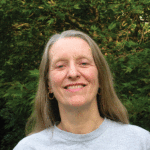
Mary Carter Bishop ’67, of Roanoke, retired after 35 years as a newspaper reporter. A graduate of the Columbia University Graduate School of Journalism, she was a member of a Philadelphia Inquirer team that won a 1980 Pulitzer Prize for coverage of nuclear leaks at Pennsylvania’s Three Mile Island power plant. In 1989, she was a Pulitzer Prize finalist for a series of Roanoke Times stories about poisonings and fraud by exterminators and other pesticide users.
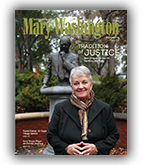
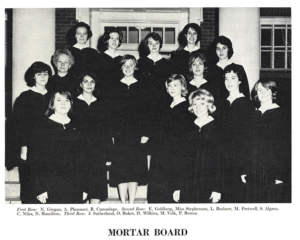
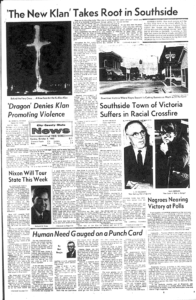
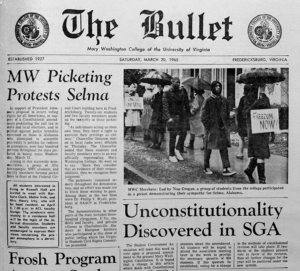
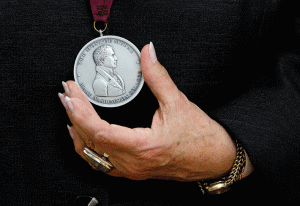
Mary’s article does great justice to Sen. Nan Orrock. Living in the rather regressive state of Georgia, Nan has always been a shining light for those of us of the progressive persuasion and without the young women of Georgia beginning to train themselves to assume her mantle we’ll lose a superstar when she ever leaves. Georgia has a new organization NewPowerPAC dedicated to just that task and in the not too distant future hopefully we’ll see more women rise through the process to become the leaders of the future. http://newpowerpacga.org